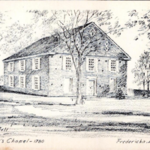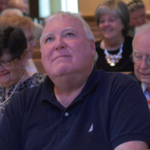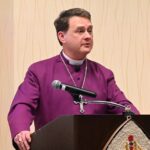Places of Spiritual Refuge:
Episcopal Congregations
Even within our Church there are refugees. Some seek refuge from one Episcopal Church congregation by joining another. Not all congregations are places of refuge. Some have been unwelcoming. And when that happens, people feel forced to leave. — The Rev. Canon Mark Harris
[photo was taken at St. Barnabas’ Church prior to a worship service]
by the Rev. Canon Mark Harris
Many members of Episcopal congregations were raised in other church traditions. In some congregations, including my own, easily half the active full-time members came from elsewhere and landed here. How did that come to be?
The church — the physical place of worship and the community worshiping — has always been a place of refuge: Jesus is offering refuge when he says, “Come to me, all you that are weary and are carrying heavy burdens, and I will give you rest” (Mt. 11:28). And by extension as the continuing body of Christ, we also issue the invitation to refuge. When The Episcopal Church proclaims in its iconic sign, “The Episcopal Church welcomes you,” it is doing the same. Monasteries traditionally gave sanctuary to the traveler or the stranger. That too was refuge.
In some sense all of us seek refuge. Many of us have had the experience of coming into church before the service and sitting quietly, perhaps kneeling for prayer. And for just a moment there is a kind of peace. It is a moment of refuge — a moment of safe shelter in a world that is too hurried, too complex.
I believe the congregations in The Episcopal Church have learned something about how to be a community of refuge; by that I mean a community that offers some sense of peace and sanctuary.
Some find this refuge to be something they seek — not just for the moment, but for a longer time. They find their way into an Episcopal Church congregation, find it inviting, a place of peace and sanctuary. And they stay, becoming members and greatly enriching our common life.
One characteristic of refugees of those seeking refuge is that they continue to remember their home with longing. Those seeking refuge may stay forever, but their hearts always have an opening for the place they left.
Our congregations all have members who left other churches to join us. Often, they don’t really stop being Methodist or Roman Catholic, or Reformed, or Lutheran; instead they find us as a community of refuge. And they will be with us as long as they need refuge, perhaps all their lives, but always shaped by their experience in their former churches.
Most Episcopal Church congregations are places of refuge in this larger sense — communities where people can come for safety and peace in a world where they feel beat up, unaccepted, threatened or judged. In some congregations a majority of active participants came from some other church.
Even within our Church there are refugees. Some seek refuge from one Episcopal Church congregation by joining another. Not all congregations are places of refuge. Some have been unwelcoming. And when that happens, people feel forced to leave.
The Episcopal Church and its congregations have become a Church of refuge slowly over the years.
We have had to learn to be welcoming. We say, “The Episcopal Church welcomes you,” but it has taken some time to figure out just what that meant. It mostly came to mean, “We can be a sanctuary for you in the midst of the world, a place of safety where you are respected and can find rest. Come in.”
At our best, our congregations become communities that welcome new members in ways that honor their own histories and understand that they may be here for refuge without making this their long-term or eternal home. Part of welcoming them has been to welcome them as sojourners … people who travel with us for a while.
How do we “count” those finding refuge in The Episcopal Church? Are they members? Guests? For many years we have counted the size of our congregation by listing those baptized and who have formally joined the congregation. Congregation size did not include sojourners, those seeking refuge. The number of Episcopalians, understood this way, is declining.
But in many congregations, there are many present, people who have sought refuge, who are not on the parish roll as baptized and confirmed members. The parish list of those formally part of the congregation, with some kind of paper trail, may be small. But Sunday attendance might be much greater than expected for the size of the formal membership. Many are counted who are there as sojourners, those seeking refuge.
Those seeking refuge need to be welcomed without being pressured to “convert” in some way or another. They are here because we have provided a safe place for them. It is not safe if they feel like they have become a commodity, something to be acquired.
A large minority of the Sunday worshiping community where I worship is Roman Catholic. Not necessarily “former” Roman Catholic, but rather estranged for one reason or another from their church. When we welcome them, we can be a refuge for them — a home away from home. But I think we also understand that there will always be a way in which their home is elsewhere.
We Episcopalians understand the matter of refuge. Indeed, many of us long for the time when we might be “back home” in a church united and catholic. In a way we are a sojourner church.
As a sojourner church, a church of refuge, we know well the dynamic of the “hope to return.” Many Episcopalians, sure of their inclusion in the Catholic Church, long for the day when the divisions are healed that lead to the break between the Eastern and Western Church. In the West we hope for the Roman Catholic Church and Anglican/ Episcopal churches, to return to the visible unity of the Church.
At the same time, we know, as seekers of refuge ourselves, the importance of being welcoming to those who are “weary and carrying heavy burdens” and the need to give them refreshment and rest. And while they are with us, for all their lives or for just a few months, they will enrich our common life and help us work for Christian unity.
In all the controversy about refugees in civil or not so civil discourse, we must remember that we too are refugees; everyone who is in and of the church seeks to live “in the shelter of the Most High” and “abide in the Shadow of the Almighty … He is my refuge and my fortress, my God, in whom I trust” (Ps 91:1-2). We take refuge in God, in the Church, and we ought to recognize that every refugee is our brother and sister.
In a small way our welcome of those who come to us for refuge is a sign of our greater understanding that we all seek refuge; and in God’s presence and the community of faithful people, we can hope to find that peace and rest.

The Rev. Canon Mark Harris is a regular contributor to the Delaware Communion Magazine, a member of the diocesan communications team, and a priest associate of St. Peter’s Church, Lewes. Mark is an avid poet and artist. poetmark1940@gmail.com
Delaware
Communion
Magazine
A Digital Publication
Winter 2024/25 edition




